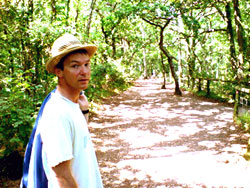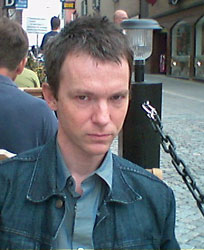 Pete Gioconda grew up on a small island. After studying in London, he began to write poems and explore his surroundings – hitching round Britain several times, including the Outer Hebrides and Orkneys, “heavenly with a girl”, and the south and west of Ireland. He started performing in his early 20s, bewildering audiences with surreal and philosophical musings or “word cages”. Pete Gioconda grew up on a small island. After studying in London, he began to write poems and explore his surroundings – hitching round Britain several times, including the Outer Hebrides and Orkneys, “heavenly with a girl”, and the south and west of Ireland. He started performing in his early 20s, bewildering audiences with surreal and philosophical musings or “word cages”.
“I fell into books, came through festivals, spewed out poetry, made horrible noises on my electric guitar, formed a band, wrote anything my hand wanted to, declared hope with strangers – always dreaming of escape to higher realms . . .”
During the dance music craze, when it seemed live music was dead, Pete Gioconda began busking in the tunnels and Lanes of Brighton and London – passing “many happy hours as the world swirled by”. He did some acting, kept on writing “lonely experimental poetry” and reading Dostoevsky, Emily Brontë, Victor Hugo, Arthur Rimbaud, Jack Kerouac, Henry Miller, Hermann Hesse, George Orwell, Castaneda, Nietzsche and “a whole host of other things, drifting through the back of beyond” – until he met Brian, “a much better musician than me, but generous with it, and not snobby”, who came and jammed bass with him. That summer, while wandering the streets, Pete bumped into Wayne, friend of “the long gone love of my life”, and they talked of forming a band, with Wayne on drums.
This became “surreal indie punk” band Gioconda Smile, who played pub gigs and festivals, the largest being Greenbelt, and went through a lot of bass players. “It was that awful period, before Oasis, when no one wanted guitar bands, not unless they were gurning punks of the cartoon variety, and we had much more up our sleeves than that.” The original line-up recorded a demo studio album Falling through Faces.
Pete Gioconda began to play solo gigs and open mics – an unsettled period that led to him starting a new band called Wilderness, with Wayne returning on drums, bass player Pete Griffiths and lead guitarist Dave Kaye. They played Attila the Stockbroker’s Glastonwick Festival and at various venues and festivals in Brighton and London, but after two years Pete decided to concentrate on recording and songwriting. |
In 2001, Pete moved to the Channel Islands, where he worked on his series of novels and computer-based song recordings, which form the basis of his first two albums. Three years later he returned to Brighton and reformed Gioconda Smile with guitarist Dave Kaye, bassist Adam Adamson and drummer Big Jim Best, singer of The Weedkillers. With a strong new set, the band played live again; but when the bass player left, Pete decided he could play more freely as a solo performer. He found the Brighton scene in 2006 “infested with smug balladeers and James Blunt imitators”, and decided to move to Bristol.
 Before bidding Brighton farewell, Pete found time to write, direct and act in black comedies Signing Off and The Stone of Folly at the New Venture Theatre. These plays introduced the character Jim, irresponsible outsider buffoon and rebel, to the world. Expect to encounter Jim again in Pete’s series of novels and radio/theatre plays. Before bidding Brighton farewell, Pete found time to write, direct and act in black comedies Signing Off and The Stone of Folly at the New Venture Theatre. These plays introduced the character Jim, irresponsible outsider buffoon and rebel, to the world. Expect to encounter Jim again in Pete’s series of novels and radio/theatre plays.
After moving to Bristol, Pete Gioconda played many solo gigs, sounding like “a kind of punky early Bob Dylan, singing his heart out and blowing a wild harmonica”. In the first half of 2007, Pete was regular guest guitarist with Bristol band The Great Admirers; in the second half he started creative open mic and band showcase A Boatload of Knees, under the maxim “Bring your own mind”. He has been bringing many new songs into his set, including the aching Alien Cat Lover, plus topical protest songs Watching the World End and The Time of Great Waste. This last song was played on the BBC Radio Bristol show Bristol Uncovered and described by the DJ as “a rather fine song”.
In spring 2008, Pete performed many of his new songs live on BBC3 TV’s Upstaged, as guest of performance artist/musician Badgertrap; and BBC Radio Bristol’s Introducing show played The End of Nowhere at the start of 2009, and then in June two songs in session Molly G and I ain't a Teenager No More, plus a cover of early sixties protest song Little Boxes, with anarchic interjections by Barry the Badger. Further radio play followed in autumn 2009, with Pete’s scathing song Whiteladies Road, about flibbertigibbets, being played by Steve Parkhouse on BCFM. |

